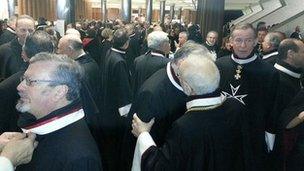Knights of Malta Catholic order celebrates 900 years
- Published

Today's order is upholding the values of the ancient Knights Hospitallers
The Knights of Malta military order of the Catholic church - which dates back to the time of the Crusades - has celebrated its 900th birthday in Rome.
The order is one of the few created in the Middle Ages that is still active.
It has now become a major international humanitarian organisation.
The order says that its battles today are no longer fought with swords, but with "peaceful tools against disease, poverty, social isolation as well as protecting the faith".
It was officially recognised by Pope Paschal II in February 1113.
Poverty, chastity and obedience
More than 1,000 knights and dames from more than 100 countries - all dressed in flowing black robes bearing their order's distinctive eight-pointed cross on their shoulders - walked in procession into St Peter's Basilica.
They attended a Mass led by Cardinal Secretary of State Tarcisio Bertone.
At the end of the ceremony, the knights were addressed by Pope Benedict XVI who congratulated them for their charitable work among the sick and the poor.
"Your esteemed and beneficent activity, carried out in a variety of fields and in different parts of the world... is not mere philanthropy, but an effective expression and a living testimony of evangelical love," the pontiff said.
The current Grand Master of the Order, Briton Matthew Festing, told the BBC: "It's interesting that a small band of Crusaders has expanded into this huge worldwide organisation.
"The reason we've survived is because we have changed from knights in armour to what we are now in the 21st Century. We are still doing what we did then, looking after the sick."
The order was originally founded by a group of aristocratic European Crusaders who looked after sick pilgrims in Jerusalem in the 12th Century, when they received official papal recognition.
Centuries later, they were chased from their headquarters in Malta by Napoleon and now have their headquarters in an ancient palace in the smartest and most fashionable shopping area of central Rome.
Today they run hospitals and humanitarian operations in more than 120 countries.
Our correspondent says that the order is eager to shed its image as a club for wealthy European aristocrats and is now searching for new talent to continue its worldwide mission.
- Published9 February 2013